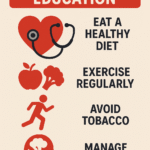
Transforming Breast Cancer Diagnosis with AI Solutions
AI in Breast Cancer Research
The Critical Role of AI
Artificial Intelligence (AI) is changing the field of breast cancer research. AI uses data analysis for a more accurate diagnosis, which is crucial for the better treatment of patients.
Why It Matters:
- Screening can be more particular.
- Early detection is an effective preventive measure for survival.
- It helps to cut healthcare expenses.
Relevance for Healthcare Stakeholders
AI, on the other hand, brings to the table for patients, researchers, and providers a game-changer:
- Patients: In the end, they become the ones who make decisions about personalized treatments.
- Researchers: Their research has advanced through the newly found insights.
- Healthcare Providers: Diagnostic tools have been improved to facilitate the processes.
- We are not only fighting against cancer but also promoting quality care with the help of AI. It is indeed the guarantee of more efficient and affordable health care for everyone!
Historical Context of AI in Breast Cancer Research
AI getting into the sphere of breast cancer research is relatively new and so impactful that the whole of healthcare is under transformation. In the past, practitioners used traditional diagnostic methods; the change to a new approach arose due to the necessity of accuracy and speed.
Evolution in the Healthcare Sector
- From Manual to Digital: Diagnostic processes have shifted drastically from manual interpretations to state-of-the-art technologies.
- Floored Data: New medical imaging and genetic data science methods open the door for the latest analytic tools.
Impact on Medicine and Public Health
AI enables doctors not only to make a more precise diagnosis but also to facilitate the treatment plan.
- Early Detection: The increased use of more effective screening solutions helps to detect tumours at the early stages.
- Resource Allocation: AI also streamlines the workflow in healthcare by automating redundant tasks and optimizing human resources.
- As a planet continuously working towards excellent health achievements, AI plays a fundamentally different role—it’s not just about technology transformation.
Current Trends in AI for Breast Cancer Research
Innovations Revolutionizing Diagnosis
Artificial Intelligence techniques have taken over breast cancer screening by developing cutting-edge, sensitive algorithms that increase detection rates.
- Increased accuracy: AI tools can easily find minor errors that are hard to catch even by human eyes.
- Faster results: A breakthrough of rapid processing rates leads to quicker diagnoses, and patients become healthier.
Impact in Numbers
- Up to 30% more accuracy in some trials could sound dramatic, but it undoubtedly works on an epidemiological scale.
- 80% of radiologists felt AI helps improve professional quality and capabilities.
- The AI tool used at this time wasn’t just a means to an end; the AI wasn’t a “helper”. It was the game that got them home in the battle against breast cancer.
Impact on Patients, Families, and Public Health
Advancements in Breast Cancer Detection
Artificial Intelligence (AI) transforms breast cancer discoveries, making early detection and diagnosis straightforward templates. This is the ray of light that hits the patients, the families, and the public health systems.
- Better, Quicker Diagnostics: With the addition of AI imaging tools, the process of identifying and diagnosing breasts can be done in a terrific hurry and very accurately and optimally, thus resulting in less idle time for patients.
- The Best Outcomes: This means that chemotherapy is not terror, and patients can enjoy prolonging their lives, which will reduce death rates and improve the patient’s well-being.
Quality of Life Enhancements
While the application of AI technology in healthcare may sometimes be nothing more than a bunch of scientific device advances in this area, it can have a massive impact on the quality of life of many people.
- Healthier Family Relations: The optimized processes make the family members less worried and ensure that the patients are catered for at the right time and place.
- Assisted Decision-Making: AI technology provides people with more detailed information and lets them take control of their life decisions.
- Let’s admit it: AI is no longer just a fashionable term; it is something we can rely on to improve the healthcare part of our lives. Every achievement of AI in the electronic field takes us closer and closer to a promised tomorrow where early detection can snatch souls from the hands of death and cure people, thus making a tremendous impact on humanity and each individual.
Impact of AI in Breast Cancer Research on Healthcare Professionals
Navigating Challenges
AI is interconnected with the investigation and the advancement of breast cancer, and that generates problems for medical persons, as well as healthcare institutions. Here are some issues:
- Training Requirements: AI is a new and complicated form of technology; staff and resources must be invested more in this area, thus depleting healthcare institutions’ resources institutions resources.
- Costs and Effects: The cost of AI is prohibitive, and many institutions are not immune to the consequences of whether they should purchase it or not. Besides, they may know that such is already an essential instrument for their operations.
- Adoption Challenges: AI integration in the workplace can be bumpy and cause staff productivity to fall alongside related issues.
Exploring Opportunities
Despite these challenges, AI in breast cancer research can become a way of progress if we follow the right path.
- Enhanced Resource Management: The AI system may allocate the best coverage, enabling the staff to concentrate more on the patient’s care.
- Improved Patient Care: AI allows the detection and diagnosis of diseases, making it possible to identify them at an earlier phase. Thus, it saves time and improves outcomes, which will lead to a reduction in mortality.
- On the whole, although managing costs and making the necessary training adjustments are the most serious difficulties, the bright possibility of improving patient care is the best incentive.
The Rise of AI in Breast Cancer Research
Transforming Healthcare Efficiency
The adoption of AI in breast cancer screening and diagnosis is one of the main factors that transform healthcare solutions. These inventions simplify the workflow, making the process more effective and precise.
- Enhanced Predictive Analytics: AI may find hidden patterns in a data set that are too complicated for people to detect.
- Increased Accessibility: Offering screening opportunities to disadvantaged areas through mobile solutions has increased in the last few years.
Patient Outcomes Matter
AI makes the healing process more effective by letting the focus fall on increasingly better patient outcomes. Early detection can improve the rate of cure and make the treatment easier.
- Less Time in Diagnostics: Patients get the outcome fewer minutes after a test, whereas shorter waiting means less worry and tension.
- Personalized Treatment Plans: AI designs ideas based on personal data.
- With the shorthanded caregivers and the need for patients to see a doctor immediately, today’s medical sector, which is so barren of the human touch, will have to call on AI to help find innovative healthcare.
Challenges in AI-Driven Breast Cancer Research
AI is radically changing breast cancer research, but it should be remembered that it has some tricky spots as well as its many advantages.
Ethical Concerns and Limitations
- Data Privacy: Patients are worried about the use of their medical data. Is their privacy intact?
- Bias in AI Models: AI can learn undiscovered biases, which can result in discriminatory treatment based on one’s race or gender.
- Transparency Issues: Highly sophisticated algorithms make it hard for patients to fathom the reasons for the diagnosis. Should we be sceptical about what we don’t see?
- Regulatory Challenges: The overseeing bodies can hardly keep up with AI’s rapid changes; thus, they are in danger of becoming obsolete regarding safety.
- Each of these concerns indicates the great interconnectedness between technological innovation and ethical decisions in healthcare. Honest information and equality become the most important ever!
Embrace AI for Breast Cancer Research
Leverage Technology Effectively
With AI, a revolution is taking place in breast cancer diagnosis. Here are different ways to take full advantage of it:
- Stay Informed: Keep an eye on online platforms that provide the most recent updates about AI in healthcare.
- Participate in Webinars: Attend virtual meetings held by professionals to learn about the role of AI in diagnosis.
- Utilize Apps: Get apps that can keep symptoms at bay or help analyze changes in your breast health.
- Revise your knowledge and get things done; technology can be a vehicle for getting better results.
Future of AI in Breast Cancer Research
Shaping Tomorrow’s Healthcare
The medical sector is now on the verge of a breakthrough. AI will open a new frontier in breast cancer research, affecting the way it can be diagnosed and treated.
- Ground-breaking Diagnostic Tools: Ale AI’s predictive power is expected to exceed the potential of traditional methods.
- Custom Remedies: An innovative healthcare system will be a nanomedicine treatment in the future because AI can analyze each patient’s situation properly.
- Career Prospects: How to cap these data analysis, AI programming, and cancer medicine careers in this area, as it continues to grow, is probably the biggest question you will come across in the sector. I:> Walmir Almeida Prepare for a future where technology and empathy intersect, making cancer care more intelligent and compassionate.
Key Takeaways on AI in Healthcare
Why Stay Informed?
AI dramatically changes the face of breast cancer research. Knowing all the perks and perils of these breakthroughs will enable people to make the right decisions regarding their healthcare.
- Boosted Screening: Rightly applied, AI will expand the pool of accurate cancer detection methods, such as mammography and colonoscopy, to new groups of people that were not possible in the past.
- Early Warning: Additionally, it will undershoot the threshold of sensitivities set by current ones; hence, it will be able to detect risks earlier than that.
- Do not miss the exciting opportunities of telemedicine!
Get Involved
Interested in knowing more about it?
- Discuss the possible AI screening options with your doctor.
- Strive to be up to date with recent health technologies.
- Get digitally friendly to respond to patients’ wellbeing emergencies—promise yourself a good life!












Post Comment